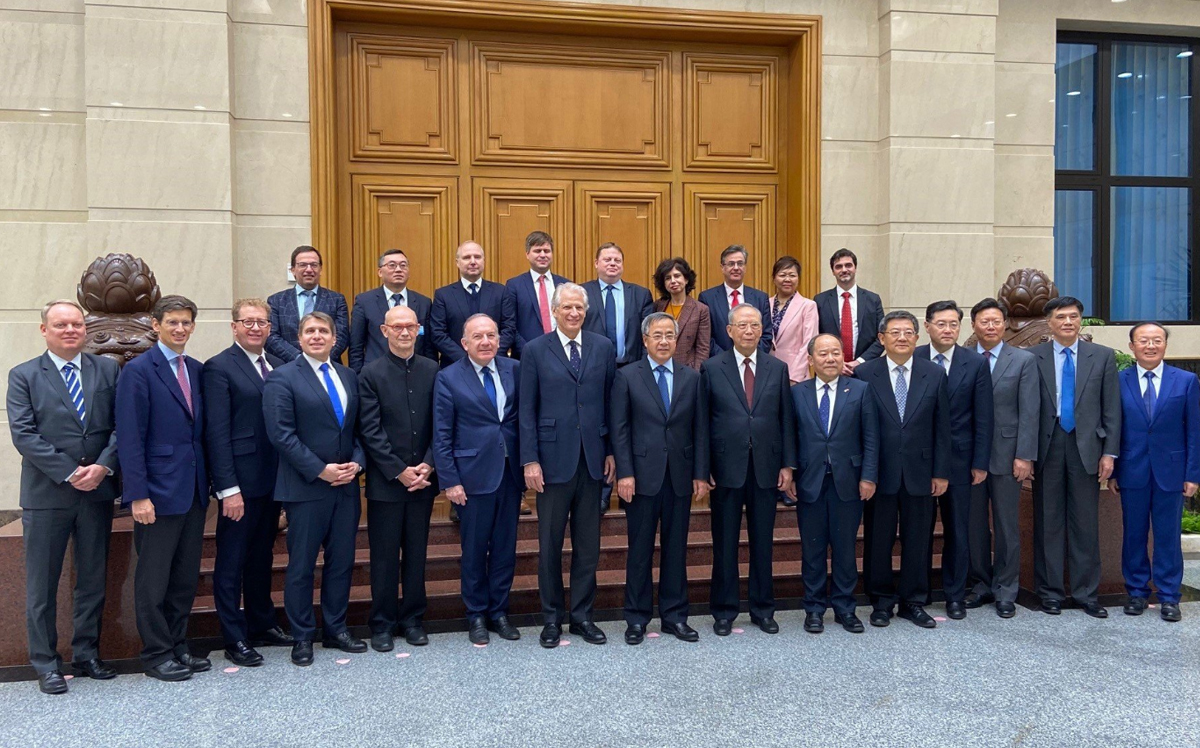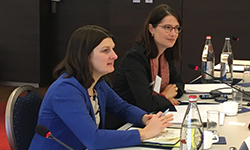BusinessEurope Headlines No. 2019-37
European business wants a stronger and fairer economic partnership with China

“We strongly encourage China’s reforms towards giving the market a more decisive role and opening up its economy to the world”, BusinessEurope President Pierre Gattaz said addressing the 3rd China-EU CEO and Former Senior Officials' Dialogue in Beijing, where he and Director General Markus J. Beyrer led a delegation on 25-26 November. There is a growing appreciation in Europe that the balance of challenges and opportunities in our bilateral relationship has shifted. To address this, the EU and China will have to cooperate more and better and build a level playing field on the basis of multilateral rules and reciprocal market access. “A fairer and more dynamic relationship between the EU and China would be enormously beneficial to the Chinese economy”, Gattaz told Vice-Premier Hu Chunhua. See the join statement.
![]() Contacts: Maurice Fermont and Benedick Wiedenhofer
Contacts: Maurice Fermont and Benedick Wiedenhofer
Video message on the future of EU trade policy
What were the main achievements of the Juncker Commission on trade and what are the main challenges for the next political cycle? Watch representatives of BEUC, ETUC, BusinessEurope and the European Commission commenting on this.
Video message on investing in Africa: what companies need
Watch what representatives of Mota-Engil and BASF - companies that are already investing in Africa - believe is needed to attract European business to the region.
Climate ambition: access to massive investments needed
 “To reach the EU’s climate ambition, industry will need access to massive investments to support the business case for high risk and disruptive technologies and innovative solutions”, said Alexandre Affre, Director of Industrial Affairs, during the Digital Finance Summit, which was organised by the European Banking Federation in Brussels on 27 November 2019. Together with representatives from BNP Parabis Fortis, Synergrid, EU Mortgage Federation and Eurochambres, Affre participated at a Panel discussion analysing “The evolving role of Banking and insurance in the real Economy“. He stressed the importance of ensuring good conditions on access to finance for all industries that demonstrate a credible transformation plan towards climate neutrality. Commenting on the taxonomy proposal, Affre said that it can bring added-value on channelling strongly needed investments into the transition, but needs to be very well-designed. In particular, enabling and transitional activities required for a successful transformation have to be fully on-board.
“To reach the EU’s climate ambition, industry will need access to massive investments to support the business case for high risk and disruptive technologies and innovative solutions”, said Alexandre Affre, Director of Industrial Affairs, during the Digital Finance Summit, which was organised by the European Banking Federation in Brussels on 27 November 2019. Together with representatives from BNP Parabis Fortis, Synergrid, EU Mortgage Federation and Eurochambres, Affre participated at a Panel discussion analysing “The evolving role of Banking and insurance in the real Economy“. He stressed the importance of ensuring good conditions on access to finance for all industries that demonstrate a credible transformation plan towards climate neutrality. Commenting on the taxonomy proposal, Affre said that it can bring added-value on channelling strongly needed investments into the transition, but needs to be very well-designed. In particular, enabling and transitional activities required for a successful transformation have to be fully on-board.
Contact: Antonia Bierbaumer
Opportunities and challenges for SMEs within global value chains
 “Reducing barriers to entrepreneurship in services sectors and tapping the potential of digitalisation and free data flow are particularly important for cutting down administrative and trade costs and supporting broader participation of SMEs in global value chains (GVC)”, said Anna-Lena Bohm, Chair of BusinessEurope’s Entrepreneurship and SME Committee during a panel discussion on 26 November, at the 2019 SME Assembly in Helsinki. The discussion, which also featured the participation of the European Commission, a Finnish entrepreneur and a representative from the European Centre for International Political Economy (ECIPE), highlighted that the dialogue between public authorities, large companies and SMEs is crucial to the development of business ecosystems with SME participation and to support trade promotion. Another key point concerned the contribution of GVCs to sustainability. Being part of GVCs in which large companies promote sustainable trade helps SMEs embrace sustainability. Sustainability means a good balance between economic, environmental and social objectives. See the event pictures.
“Reducing barriers to entrepreneurship in services sectors and tapping the potential of digitalisation and free data flow are particularly important for cutting down administrative and trade costs and supporting broader participation of SMEs in global value chains (GVC)”, said Anna-Lena Bohm, Chair of BusinessEurope’s Entrepreneurship and SME Committee during a panel discussion on 26 November, at the 2019 SME Assembly in Helsinki. The discussion, which also featured the participation of the European Commission, a Finnish entrepreneur and a representative from the European Centre for International Political Economy (ECIPE), highlighted that the dialogue between public authorities, large companies and SMEs is crucial to the development of business ecosystems with SME participation and to support trade promotion. Another key point concerned the contribution of GVCs to sustainability. Being part of GVCs in which large companies promote sustainable trade helps SMEs embrace sustainability. Sustainability means a good balance between economic, environmental and social objectives. See the event pictures.
Contact: Daniele Olivieri
Single Market in services: companies share information on barriers they face
 The European Commission’s Directorate General for Internal Market, Industry, Entrepreneurship and SMEs (DG GROW) on 27 November presented the initial results of a series of interviews with companies on the barriers they face in the Single Market. This informal roundtable was held at BusinessEurope. The interviews focussed on experiences of the companies providing engineering, cloud and logistics services as hugely relevant also for the manufacturing industry. This process aids the Commission in updating the factual knowledge on barriers to cross-border provision of services and putting the evidence on the table of the new Commissioner for Internal Market. Roundtable participants, among which representatives of four incoming EU Council presidencies - Croatia, Germany, Portugal and Slovenia - heard about provisional findings from the interviews with companies and exchanged views through an informal discussion.“BusinessEurope is ready to aid the Commission in identifying the barriers, facilitating the dialogue on practical issues and building the evidence together”, said Martynas Barysas, Director for Internal Market. This kind of discussion will be continued in the future to support the evidence-based decision making in the EU.
The European Commission’s Directorate General for Internal Market, Industry, Entrepreneurship and SMEs (DG GROW) on 27 November presented the initial results of a series of interviews with companies on the barriers they face in the Single Market. This informal roundtable was held at BusinessEurope. The interviews focussed on experiences of the companies providing engineering, cloud and logistics services as hugely relevant also for the manufacturing industry. This process aids the Commission in updating the factual knowledge on barriers to cross-border provision of services and putting the evidence on the table of the new Commissioner for Internal Market. Roundtable participants, among which representatives of four incoming EU Council presidencies - Croatia, Germany, Portugal and Slovenia - heard about provisional findings from the interviews with companies and exchanged views through an informal discussion.“BusinessEurope is ready to aid the Commission in identifying the barriers, facilitating the dialogue on practical issues and building the evidence together”, said Martynas Barysas, Director for Internal Market. This kind of discussion will be continued in the future to support the evidence-based decision making in the EU.
Contact: Martynas Barysas
How to reinforce EU social dialogue
 “Social dialogue requires trust between social partners, as well as autonomy from public authorities, to give them the possibility to exercise their practices of collective bargaining. In the future, a key factor to encourage enterprises and their organisations to invest in social dialogue is to ensure that it helps them to adapt to the new world of work". These were the main messages given by BusinessEurope Social Affairs Deputy-Director Rebekah Smith at the cluster seminar “Reinforcing the EU social dialogue and industrial relations”, organised by the European social partners in Luxembourg on 20 and 21 November. This seminar brought together social partners representatives from Czechia, Finland, Luxembourg and Slovenia, who exchanged information on their industrial relations models and learned from each other, including in relation with their involvement in the European social dialogue.
“Social dialogue requires trust between social partners, as well as autonomy from public authorities, to give them the possibility to exercise their practices of collective bargaining. In the future, a key factor to encourage enterprises and their organisations to invest in social dialogue is to ensure that it helps them to adapt to the new world of work". These were the main messages given by BusinessEurope Social Affairs Deputy-Director Rebekah Smith at the cluster seminar “Reinforcing the EU social dialogue and industrial relations”, organised by the European social partners in Luxembourg on 20 and 21 November. This seminar brought together social partners representatives from Czechia, Finland, Luxembourg and Slovenia, who exchanged information on their industrial relations models and learned from each other, including in relation with their involvement in the European social dialogue.
Contact: Jessie Fernandes
Intellectual Property Strategic Plan to benefit businesses and citizens
 The Management Board of the European Union Intellectual Property Office (EUIPO) met in Alicante and approved – among other things – the Strategic Plan SP2025, on 19-21 November. This Plan is built on a vision of delivering “IP value for businesses and citizens in Europe” through a number of interlinked strands of activities, centred on the following three strategic drivers: (1) interconnected, efficient and reliable IP system for the Internal Market, (2) advanced customer-centric services, and (3) dynamic organisational skill sets and an innovative workplace of choice. The approval of the Plan by the Management Board of EUIPO has now opened the way for its implementation by the Office, which is scheduled to start on 1 July 2020.
The Management Board of the European Union Intellectual Property Office (EUIPO) met in Alicante and approved – among other things – the Strategic Plan SP2025, on 19-21 November. This Plan is built on a vision of delivering “IP value for businesses and citizens in Europe” through a number of interlinked strands of activities, centred on the following three strategic drivers: (1) interconnected, efficient and reliable IP system for the Internal Market, (2) advanced customer-centric services, and (3) dynamic organisational skill sets and an innovative workplace of choice. The approval of the Plan by the Management Board of EUIPO has now opened the way for its implementation by the Office, which is scheduled to start on 1 July 2020.
BusinessEurope, represented at the meeting by Elena Bertolotto, Legal Advisor for Intellectual Property, welcomed the Strategic Plan SP2025 highlighting the extensive involvement of users in the consultation process that has led to its adoption. “BusinessEurope supports the EUIPO’s efforts to increase quality of its products and services, and its contribution to a stronger IP system, efficient enforcement and better understanding of IP rights in the increasingly global and digital environments”, she said, adding that the creation of a new programme focused on Small and Medium Sized Entreprises (SMEs) is also welcome.
![]() Contact: Elena Bertolotto
Contact: Elena Bertolotto
Calendar
- 1 December: New European Commission takes office
- 2-13 December: United Nations Framework Convention on Climate Change - COP25 in Madrid
- 12 December: UK general elections
- 12-13 December: European Council
Reminder: please have a look at our privacy policy